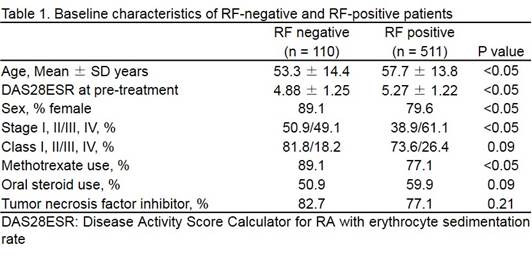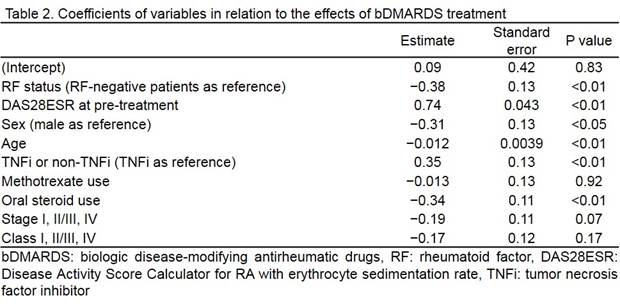Session Information
Date: Tuesday, November 15, 2016
Title: Rheumatoid Arthritis – Small Molecules, Biologics and Gene Therapy - Poster III
Session Type: ACR Poster Session C
Session Time: 9:00AM-11:00AM
Background/Purpose: The presence of rheumatoid factor (RF) plays an important role in the diagnosis of rheumatoid arthritis (RA). However, whether RF positivity is related to the effects of treatment with biologic disease-modifying antirheumatic drugs (bDMARDS) remains unclear. This study aimed to determine whether RF positivity was associated with the effects of bDMARDS treatment in bio-naïve RA patients.
Methods: We used demographic and clinical data obtained from the Tsurumai Biologics Communication Registry, which comprises Nagoya University and 20 affiliated hospitals in Japan. Patients aged 20–80 years who fulfilled the ACR 1987 revised or the 2010 ACR/EULAR classification criteria for RA were included, whereas those with prior exposure to bDMARDS were excluded. The RF status was defined as negative (0–15 IU/ml) or positive (>15 IU/ml). Linear multiple regression analysis was used to assess the association between RF positivity and the effects of bDMARDS treatment, as defined by DAS28-ESR improvement at week 24. Unstandardized coefficients were calculated. Adjustment variables included sex, age, DAS28 at pre-treatment, tumor necrosis factor inhibitor (TNFi) or non-TNFi, baseline use of methotrexate and glucocorticoids, and baseline stage and class, as defined by the Steinbrocker classification.
Results: Table 1 summarizes the baseline demographic and disease characteristics of the patients. Some characteristics were different between RF-negative and RF-positive patients; however, they were adjusted using linear multiple regression analysis. Unstandardized coefficients are shown in Table 2. The value of interest was −0.38 (P < 0.05), suggesting that the DAS28 improvement in RF-positive patients is inferior to that in RF-negative patients to that extent. Other variables affecting the treatment effects were sex, age, TNFi or non-TNFi, which are well-known influential factors for biologic therapy.
Conclusion: This study demonstrated that RF positivity, in addition to some well-known variables, was independently associated with decreased effects of bDMARDS treatment in bio-naïve RA patients.
To cite this abstract in AMA style:
Ogawa Y, Takahashi N, Kojima T, Ishiguro N. Association Between Rheumatoid Factor Positivity and Effects of Treatment with a First Biologic Agent in Rheumatoid Arthritis [abstract]. Arthritis Rheumatol. 2016; 68 (suppl 10). https://acrabstracts.org/abstract/association-between-rheumatoid-factor-positivity-and-effects-of-treatment-with-a-first-biologic-agent-in-rheumatoid-arthritis/. Accessed .« Back to 2016 ACR/ARHP Annual Meeting
ACR Meeting Abstracts - https://acrabstracts.org/abstract/association-between-rheumatoid-factor-positivity-and-effects-of-treatment-with-a-first-biologic-agent-in-rheumatoid-arthritis/


